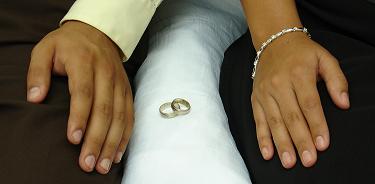Dr Cahit Guven, an expert on wellbeing and economics from Deakin University, together with his co-authors Professor Claudia Senik and Dr Holger Stichnot, wanted to find out if the happiness gap between husbands and wives really mattered. And if it did, could it act as a predictor of divorce.
Using data from three different countries (Australia, Germany and Britain), they found that the higher the gap in happiness – even during the first year of marriage – the higher the risk of divorce.
Also, in three countries across all couples, women were happier than men. But men were happier than women during marriage only for those couples whose marriages ended with divorce.
Dr Guven said the research looked at both legally married and de facto couples, and ruled out one off stressors like infidelity or other life shocks.
"We found that the gap in happiness is typically several times higher for couples who are in de facto relationships than for those who are legally married," he said.
"In Australia for instance an increase in the happiness gap by one per cent increases the probability of separation by 0.2 per cent for legally married couples versus 0.9 per cent for de facto couples after controlling for potential factors of divorce.
"Compared with Germany this is pretty good, their probability was 0.5 per cent for de facto couples and 0.16 per cent for those who were legally married.
"Interestingly, the happiness gap decreases after the divorce for the divorced couples.
"However, the happiness gap between the divorced spouses after the divorce is still higher than those couples who stay married.
"This shows that they have made a bad choice at the beginning and the happiness gap stays at some level and does not disappear even though they are not together anymore," Dr Guven said.
Dr Guven said the divorce probability was correlated with levels of income and the distribution of the housework load.
"The risk of divorce is positively related to the wife's income but negatively relates to the husband’s individual income," he said.
"Other factors that positively relate to the risk of divorce include if the couple have divorced parents or if the husband is self-employed."
Dr Guven said in contrast the likelihood of divorce was reduced if the wife was retired, a housewife or full-time student, the housework was shared or there was a common religion or background.
Dr Guven said people marrying less similar people to them could be one of the reasons why a happiness gap occurs and thus divorce risks could be seen so early into a marriage.
"Previous studies have shown that couples who marry with similar levels of schooling, age, country of origin, ethnicity religion and social background have longer marriages," he said.
"In Australia for instance 53 per cent of women of the highest happiness tier were married to men in the same tier.
"In the UK 61 per cent of women in the highest tier are married to men in the same tier and this number is 70 per cent in Germany.
"Evidence is also emerging to suggest that people have a happiness baseline which may flow according to life events, but it rarely stays below a certain level.
"Our research tends to support this view, and also shows that unlike other benefits in a marriage, happiness isn't able to be redistributed between the husband and the wife for those couples whose relationship ended with divorce."
Dr Guven said the quality of the match between the spouses wasn't the sole reason for the gaps in happiness.
"It would appear that time plays a role, so when the happiness gap becomes unfavourable to the wife, the risk of divorce increases," he said.
"If the wife is unhappy the risk of divorce the following year increases 0.4 per cent in Australia, 0.5 per cent in Germany and 0.3 per cent in the UK.
"In de facto couples the risk is 10 times higher."
Dr Guven said unhappy women also tended to initiate divorce.
"Interestingly three Australian women in five (60 per cent) said they were responsible for the decision to separate, whereas when the husbands were asked the same question only 36 per cent attributed the decision to separate to their wife," he said.
"Importantly, Australian women who initiated the divorce were actually less happy than their husbands which is consistent with the idea that divorces are initiated by women not only because they are unhappy, but because they are unhappier than their husbands."
Dr Guven said policy makers should keep the research in mind.
"Individual incomes and employment have been shown to relate to the happiness gap; policies which affect the division of labour inside the household should keep this in mind," he said.

